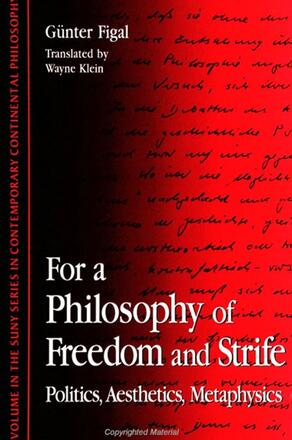
For a Philosophy of Freedom and Strife
Politics, Aesthetics, Metaphysics
Alternative formats available from:
This first book-length work of the prominent German philosopher Gunter Figal to appear in English offers a radical defense of metaphysical philosophy in the era of postmodern thought.
Description
This first book-length work of the prominent German philosopher Gunter Figal to appear in English offers a radical defense of metaphysical philosophy in the era of postmodern thought. For Figal, metaphysics does not represent an anachronistic and pernicious mode of thought that ought to be overcome but rather is a type of thinking that proceeds from a recognition of the necessary coherence of everything with its opposite. It is this agonistic relationship of opposites that Figal, following Heraclitus, terms strife. Rather than regarding the conflict of opposites as necessarily resulting in the dissolution of meaning and sense, as many contemporary thinkers maintain, Figal contends that sense and meaning can only come into existence metaphysically, that is to say, as a consequence of strife. And, the context within which strife occurs is freedom. Using these concepts of strife and freedom, Figal proposes new and provocative readings of Plato, Hegel, Nietzsche, and Kierkegaard, as well as of some of the most controversial figures of twentieth-century philosophy.
Gunter Figal is Professor of Philosophy at the University of Tubingen. He is the author of Martin Heidegger: Phanomenologie der Freiheit (Martin Heidegger: Phenomenology of Freedom) and Das Untier und die Liebe: Sieben platonische Essays (Love and the Beast: Seven Platonic Essays) and is the coeditor of the Internationalen Zeitschrift fur Philosophie (International Journal of Philosophy). Wayne Klein is Assistant Professor of Philosophy at Xavier University in New Orleans. He is the author of Nietzsche and the Promise of Philosophy, also published by SUNY Press.
Reviews
"This book will take its rightful place as a leading contribution to the burgeoning resurgence of interest in political philosophy from a continental perspective. The author operates out of an hermeneutic perspective on political philosophy, but he has an original and radical understanding of hermeneutics and metaphysics. Figal's thesis is that ontology and metaphysics, rightfully understood, offer resources for political thought that go further than any other current theory to offer a positive account of the strife between individuality and community, freedom and truth, empowerment and violence, people and institutions, action and responsibility. The point that Figal makes in each of his essays is that this strife and the apparently contradictory poles that seem to make any coherent explanation of free political life impossible are actually what produce human community. The essays are impressive in their scope, spanning from hermeneutics to phenomenology to critical theory. Along the way Figal offers an enlightened discussion of modernity and such critics of modernity as Friedrich Nietzsche, Carl Schmitt and Ernst Jünger. " —Walter Brogan, Villanova University